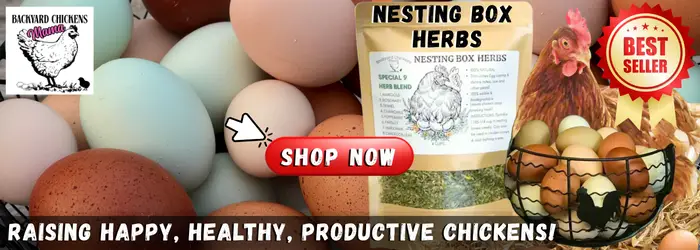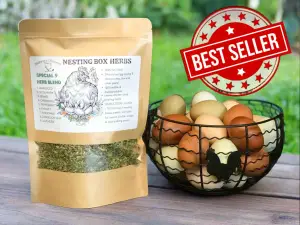
Chickens instinctively know how to clean themselves by dust bathing, preening and by molting. Unless they get “pasty butt,” excessively pooped on or have parasites, they do not need to be bathed. If you must bathe them, it is important to do it properly to prevent them from getting chilled.
Do I Need to Bathe My Chickens?
This is a common question asked from people that own chickens. The following are 5 unique facts regarding the bathing of baby chicks and chickens as well as step by step instructions on how to wash a chick if you find it necessary to.
#1 A Wet Chicken Can Die from Hypothermia
It’s important to know that a chickens’ feathers are water-resistant, not waterproof. This means that if a chicken gets a little wet, the water will run off of the them. A chickens’ feathers are not made to repel large amounts of water and during cooler temperatures can be deadly.
How do You Know if a Chicken is Cold?
- Feathers will be all ruffled up. A chicken will do this to make more air pockets between its skin and the feathers. The warmth of its skin heats up the surrounding air pockets, warming the chicken.
- It may stand on one leg. The other leg will be tucked up in its down feathers to keep it warm.
- Its comb and wattle may be pale. This is because all its energy is being put toward trying to keep warm.
- A cold hen may stop laying eggs. Instead, she will focus her energy towards keeping warm.
- Frostbite on the comb, wattle or feet. These are the areas on a chicken that are prone to getting frostbite because they are not covered with feathers. You may notice little black dots or markings on a frostbitten comb, wattle or foot.
- It’s wet and it is cold outside. A chickens’ feathers are water-resistant, not waterproof. If it is cold outside and you have a wet chicken, it is important to slowly warm the chicken back up.
Additional Tips for Warming a Wet Chicken
- A cold, wet chicken needs to be slowly warmed in order to prevent hypothermia.
- Baby chicks cannot tolerate getting wet and need to be slowly warmed right away.
- If it is cold outside and you need to warm a wet chick or chicken:
- Bring them out of the source of wetness.
- Use a warm towel to remove as much of the wetness as possible. If needed, use multiple towels.
- Use a hair dryer, on low heat, until it is completely dry. Be careful not to keep the hair blower in one position too long. Remember, low heat only.
- Or, place under a heat lamp until completely dry.
- Don’t put the chicken back outdoors in the cold until it is completely dry.
#2 A Chick can Die from “Pasty Butt” if its Backend is Not Bathed

“Pasty Butt” on a chicken occurs when a chick or chicken has loose manure, usually diarrhea, and it cakes up on its backend, blocking additional manure from being able to exit.
When this happens, the manure backs up inside a chickens intestines. If this is left untreated, it can cause a chicken to become sick and die.
Chicks are more prone to getting “pasty butt” or “pasting up” than an adult chicken. Baby chicks can die within 24 hours and need attended to right away if they have pasty butt.
Adult chickens are usually pretty good at preening themselves and removing built up manure on their backend. Sometimes they will even take a “dustbath” to remove it. (see #3 below)
A chicken can get pasty butt for many reasons, stress being the most common trigger.
| CAUSES OF CHICKEN “PASTY BUTT” |
|---|
| HATCHING |
| CHANGE OF ENVIRONMENT |
| NEW FOODS |
| LACK OF FOOD OR WATER |
| FLUCTUATING TEMPERATURES |
| LACK OF SPACE |
| PREDATORS/ FAMILY PETS |
| DISEASE OR ILLNESS |
The important thing is to recognize it in baby chicks and bathe its backend as soon as possible. For step by step instructions on how to bath a chick or chicken with pasty butt, read the article below.
#3 Chickens Roll in the Dirt to Clean Themselves

It’s true! Chickens will actually roll in the dirt to clean themselves. This is called, “dust bathing.”
Just like we take a shower to clean off, chickens will dust themselves in dirt to clean off.
It may look quite alarming the first time you see a chicken taking a dust bath. They will lay on their side and fling dirt or any bedding up on top of themselves.
Dust bathing cleans a chickens feathers and skin, and even helps to kill any parasites that may be latched on to the feathers and hiding under the feathers or fluff.
Even chicks in their first week of life can even be seen doing this!
If you notice that one of your chickens is infested with parasites such as lice or mites, try adding diatomaceous earth to its dust bathing area. This will help to kill off any parasites.
BONUS TIP: Make a dust bathing area for your chickens out in the sunshine. The sunlight is a natural sanitizer and helps to kill harmful bacteria that may be looming on their feathers.
#4 A Chicken Uses Oil from Preening Glands at the Base of Its Tail to Clean Itself

Did you know that a chicken has an oil preening gland at the base of its tail? It’s called an uropygial gland.
Usually it is covered by feathers, but when a chicken is molting, it is easier to see.
A chicken is using the oil from the preening gland when it reaches its beak to its tail end and continues to run it through its feathers.
The preening gland is filled with a thick oil that a chicken will use to coat its feathers. This oil helps to repel dirt and water. It keeps the feathers clean, fresh and more pliable. It even has some antibacterial benefits to it!
During certain times of the year, this oil can have a scent to it that attracts mates.
| OIL PREENING GLAND |
|---|
| LOCATED AT BASE OF TAIL |
| FILLED WITH THICK OIL |
| USED TO REPEL DIRT |
| USED TO REPEL WATER |
| ANTIBACTERIAL PROPERTIES |
| FRESHENS UP FEATHERS |
| KEEPS FEATHERS PLIABLE |
| ODOR ATTRACTS MATE |
It isn’t uncommon to see groups of chickens preening at the same time. Bathing is a big social event for chickens!
Next time your chickens are preening, watch them. I bet they nibble at the base of their tails (at their preening glands) and run their beaks through their feathers!
#5 Chickens Molt Annually to Replace Old, Dull Feathers with Clean, Healthy Plumage

“When a chicken molts, old feathers are shed and replaced with new, healthier plumage. Over the year, feathers break, get worn out and dirty. After a molt, feathers are full and better equipped to keep them warm.”
Why and When do Chickens Molt? (+ 5 Helpful Tips)
Most chickens will molt when the days begin to get shorter, just before wintertime.
The average molt can take anywhere between 1-4 months.
Chickens will usually lose their head and neck feathers, followed by its chest, back and thigh feathers. Lastly, it will lose its tail feathers.
Molting can be very painful for a chicken.
| TIPS TO HELP A MOLTING CHICKEN | EXAMPLES |
|---|---|
| INCREASE PROTEIN IN THEIR DIET | PROTEIN TREATS |
| DON’T HOLD THEM | PIN FEATHERS ARE VERY PAINFUL IF TOUCHED |
| DON’T PUT A SWEATER ON THEM | PIN FEATHERS ARE VERY PAINFUL WITH CLOTHES TOUCHING |
| DECREASE STRESS DURING A MOLT | DON’T RELOCATE, DON’T CHANGE FEED, KEEP SAFE, ADEQUATE FEED/WATER, AND TEMPERATURES |
| KEEP THEM ENTERTAINED (MIND OVER MATTER) | ADD A NEW PERCH, HANG A NEW TREAT |
Normally a chicken will only molt one time a year. Unfortunately, in factory farms forced molting continues to be a common practice in the U.S. The reason this is done is to increase a hens eggs production.
CONCLUSION: 5 Important Facts- Do I Need to Bathe My Chickens?
For the most part, a chicken does not need to be bathed. There are certain circumstances that will warrant a little bathing help from you.
- Chicken pasty butt, especially in young chicks. Adult chickens can usually clean themselves.
- Poop on the back, from perching under another chicken. Adult chickens can usually clean this off with frequent dust baths or during an annual molt.
Most chickens will keep themselves clean by:
| HOW A CHICKEN KEEPS ITSELF CLEAN |
|---|
| PREENING |
| DUST BATHING |
| SUN BATHING |
| MOLTING |
A chickens’ feathers are only water-resistant, not waterproof. If you find that you need to bathe a chicken or come across a cold and wet chicken, it is very important to dry them off and gradually warm them back up before placing them back into their environment.
Most chickens keep themselves clean and only need help with bathing on a rare occasion. If you need to bathe your chicken during the cold weather, make sure that you thoroughly dry it off before putting it back with the rest of the flock.








